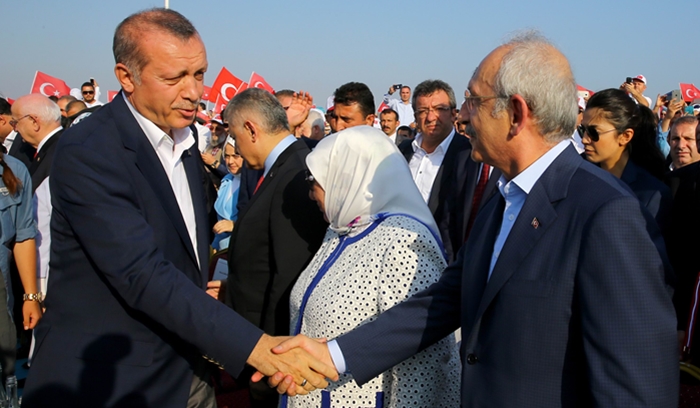As the political unity that was created after a failed coup attempt on July 15 continues to evaporate, President Recep Tayyip Erdoğan lambasted main opposition Republican People’s Party (CHP) leader Kemal Kılıçdaroğlu on Saturday, saying he does not care about Kılıçdaroğlu’s criticism of the government’s post-coup-era policies.
Kılıçdaroğlu recently said he was not pleased with the current situation of the “soul of Yenikapı,” which displayed the unity of parties for democracy during a huge rally in İstanbul’s Yenikapı district on Aug. 7.
Erdoğan repeated his unsubstantiated accusations against the Gülen movement, who he accuses of masterminding the abortive coup in July, calling its sympathizers “terrorists.” Erdoğan urged these people under persecution to become citizens of the countries to which they have fled, saying that “they will not be considered citizens of this country.”
“We have entered their lairs. They run, we are told to chase them. Are they running? Let them become citizens of the places to which they flee. They will no longer be citizens of this country,” Erdoğan said as part of his relentless witch-hunt against the Gülen movement.
Calling Muslim scholar Fethullah Gülen, who inspires the movement, which has established schools around the world, a coward, Erdoğan asked Gülen return to Turkey to stand trial. Turkey’s increasingly oppressive president argued that the Gülen movement is a terrorist organization just like the Kurdistan Workers’ Party (PKK), Islamic State in Iraq and the Levant (ISIL) and the Revolutionary People’s Liberation Party/Front (DHKP-C).
Turkey survived a military coup attempt on July 15 that killed over 240 people and wounded more than a thousand others. Immediately after the putsch, the government along with President Recep Tayyip Erdoğan pinned the blame on the Gülen movement.
Despite Turkish Islamic scholar Fethullah Gülen and the movement having denied the accusation, Erdoğan — calling the coup attempt “a gift from God” — and the government launched a widespread purge aimed at cleansing sympathizers of the movement from within state institutions, dehumanizing its popular figures and putting them in custody.
More than 100,000 people have been purged from state bodies, nearly 75,000 detained and 34,000 arrested since the coup attempt. Arrestees include journalists, judges, prosecutors, police and military officers, academics, governors, housewives and even a comedian.
Critics argue that lists of Gülen sympathizers were drawn up prior to the coup attempt.
